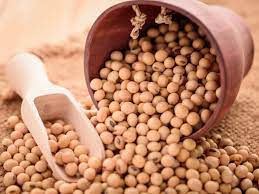Soya has been identified as a promising cash crop with the potential to revitalise and stimulate the economy of the country, pointing to become a leading source of revenue like or even surpassing cocoa.
The Soya Value Chain Association of Ghana revealed this during a consultative meeting held in Accra and emphasised that soya was progressively becoming a lucrative cash crop for the agricultural sector.
The meeting was held as part of the association’s efforts to intensify its advocacy for the development of a national strategy plan designed to promote the expansion and advancement of Ghana’s soybean industry.
The meeting was convened at the Council for Scientific and Industrial Research head office and emphasised the significance of fostering collaboration with government agencies, development partners, farmers, and similar stakeholders.
It was organised in collaboration with GIZ under the Sustainable Employment Agribusiness Programme (AgriBiz) on theme: “A National Soya Strategy Plan for Ghana’s Economy: Influencing Policy for a Soya-Business Agenda.”
Mr. Yaw Afrifa, Executive Secretary of the association, told the GNA on the sidelines of the meeting that it was to jointly identify key areas for improvement and then come out with an inclusive national strategy to address the challenges of the soya sector.
He said the move aimed to soya productivity, enhance profitability, generate substantial revenue, make a positive contribution to the overall economic growth of Ghana, and guarantee food security.
“If the country looks at soya as a cash crop, it could generate income up to the level of cocoa or even more,” he said. “And so, this is a very great potential revenue earner for the country.”
Mr. Afrifa noted that the lack of proper coordination among industry actors such as development partners, government agencies, and the private sector within the soy value chain was leading to a limited impact on the overall sector.
“We’re here to look at a national strategy plan for soya; this is because everybody is trying to do something here, something there, and we are not getting the impact.”
If Ghana considered soya a lucrative agricultural product, he said, it had the potential to generate income comparable to, or even surpassing, that of cocoa.
He urged policymakers to capitalise on this significant opportunity to generate substantial revenue and reap the numerous benefits of the growing global demand for soy.
He also urged both the government and farmers to recognise the immense potential of cultivating soybeans to diversify Ghana’s economy and increase export earnings.
Mr. Thomas W. Bello, Chairman, Soya Value Chain Association of Ghana, highlighted the importance of a comprehensive national strategy plan to establish a clear roadmap for the long-term growth of the country’s soy industry.
He said the association had hosted a consultative meeting last year which revolved around the theme “Laying the foundations for sustainability after 2024” to streamline the soya sub-sector.
Mr. Bello said the objective was to gather input and insights regarding the proposed ban on the exportation of soya from Ghana.
He said a position paper was formulated during a soybean roundtable in 2022 that urged the government to establish a national strategy plan and reassess the composition of the export control committee, among other recommendations.
It subsequently petitioned parliament, urging a review of the legislation that governs the selection process for members of the export control committee.
However, Mr. Dominic Ayine, Member of Parliament for Bolgatanga Central and chairman of the subsidiary legislation committee of parliament, advised that the process should begin from the Ministry of Trade and Industry, which is holding jurisdiction over it.
The consultative meeting called for the establishment of a formal collaboration with stakeholder organisations like the Alliance for the Green Revolution in Africa, the Ministry of Food and Agriculture, and the Ministry of Trade and Industry.















































